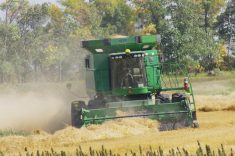Farm consolidation is good, cultured meat has a rosy future and the carbon tax needs greater analysis.
Sylvain Charlebois, Canada’s self-described ‘Food Professor’ and director of Dalhousie University’s Agri-Food Analytics Lab, elaborated on those points in a wide-ranging talk at the September Canadian National Millers Association’s annual meeting in Montebello, Que.
“I think consolidation is desired actually,” he said. “I know that media hates to hear the message that we’re killing the family farm, but I actually see it another way. I think to support the supply chain you really need farming to perform and to mitigate risks in a strategic way.”
Read Also

Trade uncertainty, tariffs weigh on Canadian beef sector as market access shifts
Manitoba’s beef cattle producers heard more about the growing uncertainty they face as U.S. tariffs, and shifting trade opportunities, reshape their market.
Why it matters: Farm consolidation appears unstoppable, dictated by economies of scale, but opinions differ on whether that trend is a positive one for Canadian agriculture.
Bigger farms can better afford the technology to become more efficient, which helps Canada’s food system, said Charlebois. However, he doesn’t think farm consolidation should happen faster than the current trend, he added in a later interview.
“Given the challenges we’re all going to be facing in the future, like the effects of climate change, labour costs, transportation costs, you need highly efficient farms,” he said. “You need professionally run farms. In order to make Canada an agricultural powerhouse, as it should be, you can’t do it without a healthy cadre of farms.”
Hobby farms are fine so long as they don’t rely on governments to survive, he added.
“We’re not in that era anymore. This is about competitiveness. I am of the mind (that) if we lose farms, I am actually fine with that.”
Farm consolidation is happening worldwide, Charlebois said.

The number of Manitoba farms peaked in 1941 and has declined ever since, while size increases. The most common explanation is economies of scale — increasing efficiency by spreading costs over more acres.
Not everyone agrees that a scenario with fewer, bigger farms is better, including the National Farmers Union (NFU). Fewer farms means fewer young farmers, less climate change resiliency, a decline in the rural economy and farmers’ political clout and further concentration of wealth, according to a paper written by NFU director Darrin Qualman and four others entitled Concentration Matters, Farmland Inequality on the Prairies.
However, the shift to larger farms is accelerating, according to a September news release from Agri-Food Economic Systems Research. As small- and medium-size farms disappear, there is less demand for used farm equipment. That affects large farms that partially finance new equipment purchases with trade-ins, the group said.
Like many others in Canada’s agriculture industry, Charlebois welcomed the 2017 release of the Barton report, prepared via the Advisory Council on Economic Growth. It highlighted the sector’s potential to boost the economy by increasing its share of global agricultural exports by 2027 to eight per cent, from 5.7 and by doubling Canada’s share of world agri-food exports to 5.6 per cent from 2.8 per cent.
The much-ballyhooed report isn’t often referenced now. In recent speeches Charlebois said he had to remind the audience about it, and “that’s a bad sign.”
Cultured meat
The Liberal government could rekindle the Barton report’s enthusiasm by developing a food strategy, Charlebois said. Ottawa is spending “like drunken sailors,” in areas such as food waste, farm supports and superclusters, but it lacks vision.
“It’s all great, but I am seeing some clouds on the horizon,” Charlebois said. “For example, lab-grown meats — many people see this as a far-fetched, sociopath project, but I would say this is something that’s going to happen eventually.
There are over 150 projects around the world right now supporting lab-grown meat products. Billions of dollars are being poured into these projects and Canada is a very, very small player… This is just the beginning, seriously.”
Actor Leonardo DiCaprio invested $12 million a few years ago in what was then a new startup called Beyond Meat, Charlebois said. The plant-based, meat substitute company is now worth $8 billion.
“I think there’s a future for livestock,” Charlebois said. “There are a lot of things going on right now to get people to think differently about food, whether it’s the environment, animal welfare, their own health, the cost of food.
“You need a mortgage to buy food these days. It’s really expensive. If it’s not bothering the cattle industry, it should. If you add the carbon tax to that, guess what’s going to happen?”
Beef and other food prices in Canada and around the world have been rising for months with experts pointing to supply chain problems due to the COVID pandemic and drought.
Carbon tax
Food prices will continue to rise in part due to the carbon tax, added Charlebois. The tax is $40 a tonne this year and rises to $50 in 2022. The impact on gasoline and diesel prices is still within the historic fluctuation at the pumps, but that won’t be the case when the tax peaks $170 a tonne by 2030.
“That’s a lot,” Charlebois said. “At $50 I was ‘yeah, whatever,’ you can work your way around it, but at $170 it’s a bit of a game changer. It’s going to be quite a lot. I don’t see how food affordability won’t be impacted in some way.
“They (government) have no idea how a tax of $170 (per tonne on carbon) will impact the affordability (of food) in Canada. They have not done the calculations whatsoever… ”

Still, Charlebois is of two minds on the tax. First, he says the farm fuel exemption should include grain drying and heating barns. But the tax could also encourage more domestic processing by making it more expensive to export raw products.
“The carbon tax could shift things around,” he said. “I know your readers are very skeptical of the carbon tax and I think they have every right to be skeptical because we still don’t know how the tax will affect the entire chain. Nobody has done the work.”
Food costs
When food prices rise, consumers think collusion, Charlebois said. But supply and demand are small parts of food price calculations.
“Grocers will set prices on what they think the market can bear and secondly they will protect margins.”
Is Canada’s grocery sector competitive?
“It depends how you see it, but you can question that for sure,” he said. “It’s an oligopoly (a market dominated by a small group of large sellers). Oligopolies tend not to be that competitive.”
A survey conducted earlier this year by the Agri-Food Analytics Lab showed baby boomers are more sensitive to rising food prices.
“I think the older generation became accustomed to cheap calories, to be honest with you,” said Charlebois. “I suspect that the percentage we spend on food relative to income will increase.”
Consumers and modern farming
Genetically modified crops and pesticides have made Canadian agriculture more sustainable, but that message isn’t reaching consumers, Charlebois said.
“I actually cringe when I see and hear some of these things on Twitter. All the misinformation, it’s incredible. Canadians will go after drama. They’ll go towards the reporter who will say glyphosate is poison and GMOs should be banned. That is a complete misunderstanding of what we do in Canada.
“If we want to honour the Barton report, we’ve got to embrace these kind of technologies. Glyphosate is a sustainable solution… but most Canadians actually think it is the opposite. Why? Because other lobby groups are winning with fear.
“Unfortunately, that’s your biggest enemy: fear.”
















